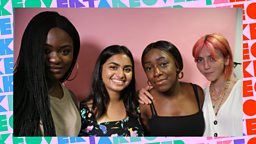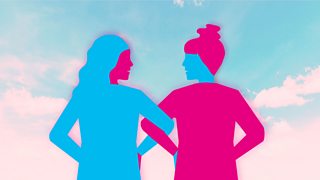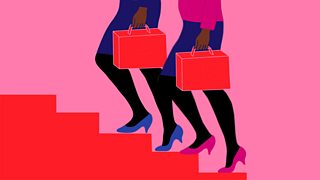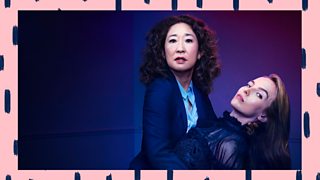Eight things Love Island has taught us about relationships

This year’s Love Island has proved so popular with fans they’ll be rewarded with not one, but two series in 2020. But while critics dismiss the bikini-heavy reality show as vacuous fluff that is way too focused on unrealistic body ideals, others have called it a "feminist masterpiece" which can teach young people a LOT about relationships.
Free Periods campaigner Amika George chose to tackle the topic when she guest-edited Woman’s Hour as part of our Takeover Week. She and guests Scarlett Curtis, Bolu Babalola and Ore Ogunbiyi share what they think young people can learn from watching the programme…
1. It give us perspective on our own previous relationships (and what we want from the next)
“I think it really shines a light on what is not ok in relationships,” says writer and pop culture commentator Bolu Babalola.
“When we're in relationships we're blinded by affection and love and it can really cloud our judgement, but when your role as an audience member is to actually judge if these relationships are real or not, you begin to see things with a more critical eye.
“[Viewers] can really learn about abuse patterns in relationships and also how they do want to be treated. It's allowing me to look at certain situations in my past that I would have locked in a box otherwise and think, ‘Hmm, that was perhaps quite abusive and emotionally manipulative’. It really does give us a light to analyse ourselves with."
2. You can see multiple examples of gaslighting
“A lot of young people who may have been confused about gaslighting before have really seen it happen this season; [there’s been] a lot of really twisted, manipulative behaviour,” says writer and campaigner Scarlett Curtis.
“It’s amazing for people to see that happen and be able to identify it when it happens to them. Michael behaved awfully to Amber and went off with another woman, then twisted it to make her feel like it was her fault, calling her crazy, angry, childish. It meant that when she wanted to be angry, which she was justified to be, she couldn’t - because he would go, 'well, yeah, you’re confirming my point'."
3. Feminists and love island DO mix
“I have an insane WhatsApp group with about 60 feminists in, a lot of whom are men,” says Scarlett. “It would not be the same show if you didn’t discuss it.
"We go very deep, there’s a lot of sharing our own stories of similar things that have happened to us. There’s also a lot of feminist theory, picking apart the toxic masculinity… and yesterday we were talking about how Love Island compares to Shakespeare.”
"Love Island is a feminist masterpiece."
4. It’s watching ‘the patriarchy in action’
“I talk about feminism all day every day and it’s very rare that you get to see it happening in real time. I truly believe that watching Love Island is watching the patriarchy in action,” says Scarlett.
Amika George adds: “Love Island is giving boys and our dads the opportunity to see these issues on our TV and want to do something about them, and to recognise there’s a real problem in society with the way that men treat women.”

Ore Ogunbiyi, co-author of Taking up Space, believes male Love Islander Ovie has been a shining example of how to overcome this.
“Ovie tends to be a middle man who helps convey to the boys what the girls are actually feeling, and it's symbolic of how men also have a role to play… speaking up for us in spaces where we can't. [Often] the women in Love Island aren't the ones in the room when guys are having all the deep conversations about them, but he can be there to say, 'Nah, that's not on'."
5. We can see the true emotional impact of bad behaviour
“Two of my younger brothers have been watching it,” says Scarlett. “They’re 15 and 17 and it’s such an easy format to then talk about it. You’re not making them read a book of essays about consent, you’re letting them see it every night.”
“I watch it with my brother and my brother's best friend,” adds Ore, “and often they're like, ‘oh well, that's just the way guys are’. But it's also making them interrogate that and interrogate why that's how they are.
“Sometimes guys root for the guys at the beginning, but then the drama becomes so deep they’ll be like, ‘oh I can't really be supporting that’. I think the guys have been pretty diabolical this season in how they treat women and I'd like to think that guys see that as an example they don't want to follow.”
6. There is true strength in female friendship
“You’re also watching women fight back and stand up to these men and join together,” says Scarlett.
“This season especially has really been about the power of female friendship in an amazing way, the power of women coming together. How no matter what happens, you have your friends and they’ve got your back.”
7. You see the role race can play on the British dating scene
“As a dark-skinned black woman, the desirability politics are so mired with colourism… you see how dark-skinned women are seen as less of a romantic option,” Bolu told Woman’s Hour.
“But when dark-skinned black women speak about this, it sounds as if we're being dramatic and we're projecting our insecurities. It's not exactly joyous to watch this on TV, but it shows that this happens in society. People can't really ignore it when they’re watching it every day for 8 weeks.”
8. There are still lots of big conversations to be had
“Love Island objectifies women, it’s got bad body standards,” says Scarlett. “But [it’s] reflecting the world young people live in now. These are the things we’re bombarded with all day every day. And I would rather be watching them and analysing them instead of pretending this doesn’t happen.”
“I think Love Island can be an opportunity for young people to see issues in society: issues in relationships, issues in mental health, body issues, the fact that everyone is just so obsessed with the way they look,” believes Amika.
“It’s just still very misogynistic, and hopefully some people will use this opportunity to challenge these issues and talk about them.”
Listen to Amika George’s Woman's Hour Takeover programme to hear more on Love Island, plus period poverty, the power and influence of grime music and diversity, inclusion and access in university education.
Watch Scarlett Curtis debunk some of the biggest myths about feminists in our video 'Feminists don’t wear pink' and other lies.




